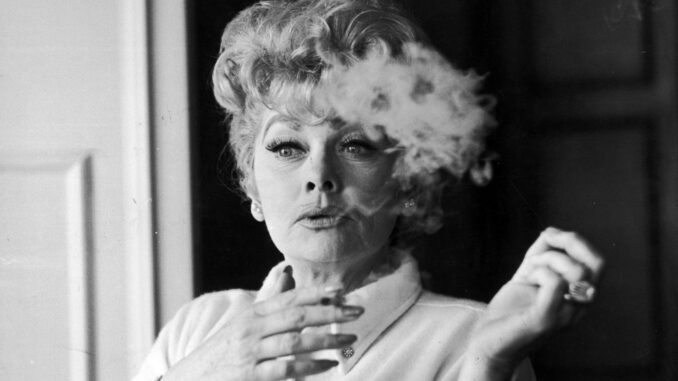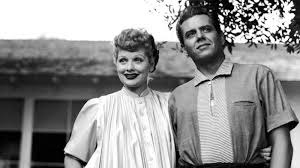
The Hidden Truth Behind ‘I Love Lucy’s Deadly Sponsorship
I Love Lucy remains one of the most iconic and beloved sitcoms of all time. With Lucille Ball’s impeccable comedic timing and Desi Arnaz’s groundbreaking production techniques, the show became a cultural phenomenon. But did you know that this legendary sitcom had a smoky secret? Behind the laughter and family-friendly humor, I Love Lucy signed a deal that tied it to one of the most dangerous industries in history: Big Tobacco.
Let’s dive into how a sponsorship deal with a cigarette company turned the show into an unwitting promoter of a deadly habit.
The Golden Age of Television and Cigarette Ads
In the 1950s, cigarette advertising was everywhere. From radio to magazines, tobacco companies ruled the advertising world. When television began to dominate media, Big Tobacco quickly saw an opportunity to reach millions of viewers.
Back then, smoking wasn’t seen as harmful. In fact, it was often marketed as glamorous and sophisticated. Doctors even endorsed cigarette brands in ads, claiming they were “less irritating” or “soothing for the throat.”
Philip Morris and ‘I Love Lucy’: The Smoky Partnership
When I Love Lucy first aired in 1951, it was sponsored by none other than Philip Morris, one of the largest tobacco companies in the world. At the time, sponsorships were the backbone of television production, and Philip Morris jumped at the chance to align their brand with the hottest show on TV.
But there was a catch: Lucille Ball and Desi Arnaz were required to integrate cigarettes into the show’s content.
Cigarettes On-Screen: A Deadly Product in Plain Sight
If you watch early episodes of I Love Lucy, you’ll notice something peculiar: cigarettes are everywhere. Whether it’s Lucy and Ricky lighting up at home or a pack of Philip Morris cigarettes conveniently placed on a table, smoking became a natural part of the show.
Lucille Ball herself was a smoker in real life, so this integration seemed effortless. However, it wasn’t just casual smoking—it was strategic product placement orchestrated by Philip Morris.
The Commercials That Made Smoking Look Harmless
In addition to on-screen smoking, I Love Lucy episodes often featured cigarette commercials during breaks. Lucille Ball and Desi Arnaz personally endorsed Philip Morris cigarettes in these ads. They would appear on-screen, smiling and holding a cigarette, as they delivered lines like, “Call for Philip Morris!”
These commercials made smoking look fun, stylish, and completely harmless—a far cry from the truth we know today.

Why Did ‘I Love Lucy’ Agree to This Deal?
You might wonder why Lucille Ball and Desi Arnaz agreed to such a sponsorship. The answer lies in the financial landscape of 1950s television. Shows relied heavily on sponsorships to cover production costs, and Philip Morris offered a lucrative deal.
At the time, smoking wasn’t linked to serious health risks. The dangers of cigarettes were not widely known, so there was no public outcry over these ads.
The Long-Term Impact of Cigarette Ads on TV
The partnership between I Love Lucy and Philip Morris wasn’t unique. Many shows during the 1950s and 1960s were sponsored by tobacco companies. However, I Love Lucy’s massive popularity amplified the impact of these ads.
Millions of viewers saw their favorite TV stars smoking, which normalized the habit and encouraged countless people to pick up cigarettes.
The Smoking Epidemic: What We Know Now
Fast forward to today, and we understand the devastating consequences of smoking. According to the CDC, smoking is responsible for over 480,000 deaths annually in the United States alone. It’s a leading cause of cancer, heart disease, and respiratory illnesses.
Unfortunately, the normalization of smoking in popular media played a significant role in the rise of this epidemic.
Lucille Ball’s Personal Battle With Smoking
While Lucille Ball’s on-screen smoking was part of the sponsorship deal, her off-screen smoking was personal. Ball was a lifelong smoker, and it ultimately took a toll on her health. She passed away in 1989 due to complications from an aortic aneurysm, a condition often linked to smoking.
When Cigarette Ads Were Finally Banned
The tide began to turn in the late 1960s when research linking smoking to lung cancer became undeniable. Public pressure mounted, and in 1971, cigarette ads were officially banned from television and radio in the United States.
This marked the end of an era—one in which shows like I Love Lucy had unknowingly contributed to the smoking epidemic.
Did ‘I Love Lucy’ Regret the Deal?
While there’s no public record of Lucille Ball or Desi Arnaz expressing regret over the Philip Morris deal, it’s hard to ignore the consequences. The show’s influence on smoking habits is undeniable, and its association with Big Tobacco remains a controversial chapter in television history.
The Legacy of ‘I Love Lucy’: More Than Just Cigarettes
Despite its smoky sponsorship, I Love Lucy remains a groundbreaking and beloved show. It paved the way for modern sitcoms, introduced innovative filming techniques, and showcased the comedic genius of Lucille Ball.
While the cigarette deal is a dark spot on its legacy, it’s also a reminder of how far we’ve come in understanding and addressing public health issues.
Conclusion
The story of I Love Lucy and its partnership with Philip Morris is a fascinating look at television history and the influence of advertising. While the show unknowingly promoted a deadly habit, it also serves as a powerful example of how media can shape societal norms—for better or worse.
Today, we remember I Love Lucy for its laughter, innovation, and timeless charm—but we also acknowledge the lessons learned from its smoky past.
FAQs
1. Why did ‘I Love Lucy’ promote cigarettes?
The show was sponsored by Philip Morris, a major tobacco company, which required product placement and commercials featuring their cigarettes.
2. Did Lucille Ball smoke in real life?
Yes, Lucille Ball was a lifelong smoker, both on and off the screen.
3. When were cigarette ads banned from TV?
Cigarette ads were officially banned from television and radio in the United States in 1971.
4. Did Lucille Ball regret the cigarette sponsorship?
There is no public record of Lucille Ball expressing regret, but the long-term impact of smoking ads is now widely understood.
5. How did cigarette ads affect viewers in the 1950s?
Cigarette ads normalized smoking, making it appear glamorous and harmless, which encouraged many people to start smoking.